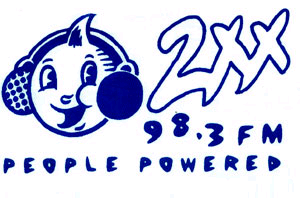Canberra community station, 2XX, had the plug pulled on its broadcasts in May for unpaid transmission bills, but is now back on air, with its debt to Broadcast Australia paid.
On Monday 3 May, Broadcast Australia switched off the power for 2XX FM’s transmission because of an unpaid annual transmission bill worth $30,000. After two days off air, the station’s transmissions were resumed on 5 May, and an agreement was struck for the amount to be paid by 30 June.
The saga of the unpaid bill is either a warning to other community broadcasters not to default on an important item like transmission costs, or an illustration of monopoly power, depending on whose side you are on.
According to 2XX, it is a matter of the big company abusing its monopoly power to disadvantage a small customer: “Broadcast Australia has the monopoly on all FM transmission in the ACT [from Telstra Tower], and charges 2XX almost $30,000 annually for the rent of a small space (less than 10 square metres) and electricity.”
According to Broadcast Australia, business is business and customers should pay their bills. A Broadcast Australia source close to the dispute told radioinfo: “We are a business and we had a customer which could not pay us. We gave them time to pay, but they didn’t, so we could no longer provide them with the service.”
2XX Station Manager Indra Esguerra told radioinfo:
“We defaulted on our payment plan, then we had no contact from them until we got a letter the same day as they cut us off… they left us no room for negotiation… they wanted full payment or else.”
The station’s bill had been unpaid for more than six months when the transmission was cut in May. Esguerra admits the station should have been paying quarterly.
“We were having financial trouble – in 1999, we moved premises and converted to FM, meaning we had to buy a new transmitter, all within six months. We had some debts, which we are just getting on top of now.”
ACT senator, Kate Lundy, lobbied on the station’s behalf and Broadcast Australia turned the transmitter back on and accepted a part payment of $10,000, with the understanding that the full amount would be paid by the end of the financial year, last week.
Esguerra says that amount has been paid and the station’s finances are looking more healthy. She expects she will be able to pay the Broadcast Australia bill on time in future.
2XX is one of Australia’s longest running community radio stations, and was on the AM band for most of its history, which began in 1978. It now broadcasts on FM 98.3.
Esguerra told radioinfo the station earns about $200,000 – $250,000 revenue each year, of which about 40% is from government grants and the other 60% is from fundraising activities, sponsorship and subscriptions. She says state and federal government grants have been decreasing in recent years.
2XX “does not exist to imitate the style, content or political bias of the media in Australia. Instead, 2XX aims to provide a voice for the voiceless. 2XX FM is a community organisation. Like all community organisations, it has very little money” says the station’s website. It relies on volunteers who support the station’s philosophy.
“Hundreds of community groups rely on Community Radio 2XX to get their message across to the broader community, including more than 20 language groups, among others. The station’s programs are presented by more than 200 volunteers, bringing Canberra’s listeners a broad range of music, arts, culture, community news and current affairs.”
Community stations all over the country have been watching the case to see what precedents it will set for their relations with Macquarie Bank’s Broadcast Australia.
Broadcast Australia owns and operates the most extensive terrestrial broadcasting network in Australia, providing transmission services for radio and television (analogue and digital) broadcasters; site sharing and infrastructure services.
Broadcast Australia is a 100% owned subsidiary of listed company, Macquarie Communications Infrastructure Group.
The company, which was formerly NTL, has about 600 strategic transmission sites across metropolitan, regional and rural Australia and its core business is the transmission of the television and radio broadcasts of the ABC and SBS to more than 99% of Australian households. Its customers include national broadcasters, commercial broadcasters, community Broadcasters and telecommunications companies. Broadcast Australia is conducting digital radio trials in Melbourne.

